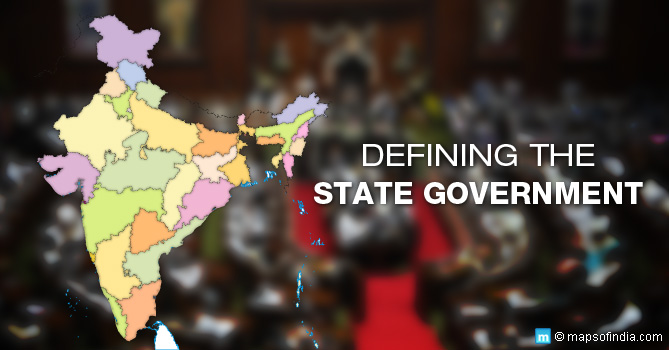In a federal form of government, the state government is the government of a country’s subdivisions and shares political power with the national government.
In the Constitution of India, which is a sovereign socialist secular democratic republic, the country has three levels of governments: the Central, the States and the Union Territories, besides the third level of governments, comprising the panchayats in rural areas and municipalities in urban areas. In India, the state governments are the level of government below the central government. Each state of the country is governed by the state government. There are 29 state governments in our country, each of which is headed by the governor and the chief minister. The CM also heads the council of ministers.
Structure of the state government
Executive: State Executive comprises the governor and the chief minister with his council of Ministers. The Governor of each state is appointed by the President for a period of five years. Executive power of the state is vested in the governor. But the actual powers for proper functioning of the state are vested in the CM and his council of ministers.
Judiciary: State high courts have jurisdiction over the whole state. In the states, the judicial setup is headed by the chief justice. He manages and controls the entire judicial system of the state pertaining to criminal, civil and all other forms of litigation. State high courts have to, however, report to the Supreme Court of India, which may override the high court’s findings and judgements.
Legislature: Each state has a legislative assembly. It consists of the governor and one House or two Houses, as the case may be. In seven states, the state government’s legislature is bicameral. These states are Bihar, Andhra Pradesh, Telangana, Jammu and Kashmir, Karnataka, Maharashtra and Uttar Pradesh. These states have two Houses known as legislative council and legislative assembly. The rest of the states are unicameral. There is only one House known as legislative assembly. State Legislature or State Assemblies are headed by the CM.
Legislature has two divisions Vidhan Parishad or Legislative Council
- Not more than one-third of total number of members or 40 members in legislative assembly of the state, except in J&K with 36 members.
- Elected members are called Member of Legislative Council (MLC)
- Elected by Governor, MLAs, standing graduates etc.
- No MLC can be member of Cabinet of Ministers.
Vidhan Sabha or Legislative Assembly
- Not more than 500 and not less than 60 members (an exception is the Legislative Assembly of Sikkim. It has 32 members)
- Fixed number of seats in every state.
- Different number of seats for different states
- Elected members are called Members of Legislative Assembly (MLA)
- Elected by the people of that state
Roles and Responsibilities of the state governments
State governments have separate departments for proper functioning of the state. States have jurisdiction over education, agriculture, public health, sanitation, hospitals and dispensaries and many other departments.
- Internal security: The state governments have to maintain the internal security, law and order in the state. Internal security is managed through state police.
- Public order: States have jurisdiction over police and public order
- Education: Providing a public education system, maintaining school buildings and colleges, employment of teachers, providing help to under privileged students all come under the education department of the state.
- Agriculture: The state governments have to provide support for farmers, funds for best farming practices, disease prevention and aid during disasters such as floods or droughts.
- Finances: State legislature handles the financial powers of the state, which include authorisation of all expenditure, taxation and borrowing by the state government. It has the power to originate money bills. It has control over taxes on entertainment and wealth, and sales tax.
- Reservation of bills: The state governor may reserve any bill for the consideration of the President.
- Transport: State government runs the rains, trams, bus and ferry services and other public transportation in the cities and towns of the States.
- Water supply: Water supply to cities and towns for drinking, including irrigation for farmers, is the responsibility of the State governments.
- Budget: State governments make budget for state.
Allocation of funds: It has the power to give funds to all its organizations like Zila Parishad, corporation, and other departments






